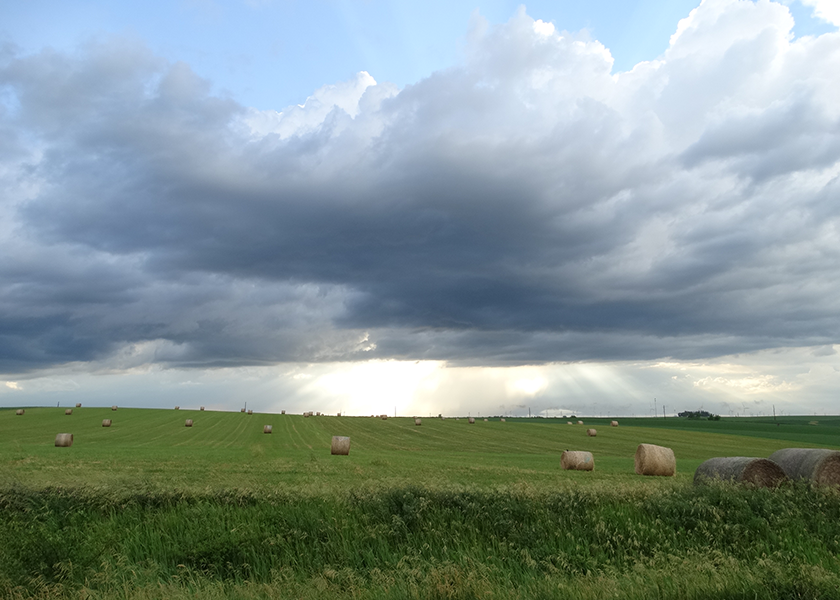Evening Report | October 18, 2023

Check our advice monitor on ProFarmer.com for updates to our marketing plan.
Livestock producers: Extend corn, soymeal feed coverage... Corn and soybean meal futures are signaling seasonal lows are in place. With both markets trading at levels we consider value buys, we advise livestock producers to extend corn-for-feed and soymeal needs in the cash market another four weeks through November.
Jordan loses ground in second speaker ballot... House Judiciary Committee Chair Jim Jordan lost ground in his bid to become speaker. Twenty-two House Republicans voted against Jordan – two more than yesterday. Jordan remains far short of the 217 votes he needs to win the gavel.
Feedlot inventory expected to be fractionally lower than year-ago... Traders expect USDA’s Cattle on Feed Report Friday afternoon to show the feedlot inventory as of Oct. 1 down 0.3% from year-ago at 11.420 million head, which would be the 13th consecutive month of year-over-year declines. Placements are expected to have declined 2.0% while marketings are seen down 6.8% from year-ago.
|
|
Avg. Trade Estimate (% of year-ago) |
Range |
Million head |
|
On Feed on Oct. 1 |
99.7 |
99.0 – 100.3 |
11.420 |
|
Placements in September |
98.0 |
90.2 – 103.4 |
2.043 |
|
Marketings in September |
93.2 |
88.0 – 102.5 |
1.734 |
Arkansas requires Syngenta to sell farmland in landmark move... Arkansas Governor Sarah Huckabee Sanders, accompanied by Attorney General Tim Griffin and other Republican leaders, made a groundbreaking announcement on Oct. 17, stating Arkansas will mandate Chinese-owned Syngenta to divest around 160 acres of farmland in Craighead County, Arkansas. This decision marks a significant move as it prohibits foreign entities from “owning agricultural land” within the state.
Syngenta, headquartered in Switzerland and owned by ChemChina, a Chinese state-owned enterprise specializing in seeds and pesticides, will be compelled to sell the land in compliance with this new regulation. Notably, ChemChina is listed by the U.S. Department of Defense as one of several “Chinese military companies” involved in activities in the United States.
The decision follows the enactment of a 2023 state law that bars foreign-controlled businesses from owning land in Arkansas. Governor Sanders underscored concerns over Chinese companies operating in the U.S., asserting they transmit information and technology back to China, potentially compromising American research and national security interests.
Syngenta has been informed of the requirement, and if they refuse to comply, Attorney General Griffin will initiate legal proceedings to enforce the divestment.
Griffin disclosed that Northrup King Seed Co., a Syngenta subsidiary, has a two-year window to divest its land in Craighead County. Failure to comply may result in a civil penalty fine of up to 25% of the property’s value, which is estimated at approximately $1.12 million, potentially equating to a maximum fine of $280,000.
Syngenta expressed disappointment with the decision, stating that no directives from China prompted their land acquisition in 1988.
Beige Book: Economic conditions relatively stable... The Fed’s Beige Book, which looks at economic conditions across the 12 districts, noted little to no change since the last report in September. Districts reported the following specific to agriculture:
Atlanta: “Agriculture conditions were mixed. Demand for butter increased, but there remained an excess supply of cheese products. In Louisiana and Mississippi, droughts led to the liquidation of herds, resulting in an oversupply of beef. Chicken exports were weak. Soybean and corn yields were strong, creating surpluses. Domestic cotton yields were high, but demand for textiles softened. Hurricane Idalia hit Florida’s ‘timber basket,’ causing farmers to give away downed trees or pay to have them removed, dampening sales of timber.”
Chicago: “Projected farm income in the District for 2023 remained well below 2022 levels, as lower crop prices offset positive news from early harvested acres. Notably, corn and soybean prices continued to fall, while yields were coming in above earlier expectations, which had been pessimistic due to the ongoing drought. Cattle prices moved higher, but growth slowed some. That said, one contact reported that with the exception of beef, many animal operations were experiencing below breakeven prices. Egg prices were flat, while dairy prices were mostly higher. Prices for agricultural land showed signs of softening, especially for ground of lesser quality. Rising interest rates stretched farm finances given high debt levels of many operators.”
St. Louis: “Overall agricultural activity has remained stable since our previous report, though contacts’ outlook for future conditions was mixed. Corn and cotton yields across the District fell slightly below 2022 levels, while rice and soybean yields hovered slightly above. Corn and rice production increased relative to this time last year, but cotton and soybeans decreased. Low water levels meant that barges needed to float at a lower weight, which raised shipping costs. Due to elevated storage and transport costs, some contacts stated they planned to leave their crop in the field rather than harvest.”
Minneapolis: “District agricultural conditions strengthened slightly since the previous report. Drought conditions moderated in parts of the District but persisted in the eastern and northern regions. Industry contacts reported that early indications of crop production were better than expected, given weather conditions. However, farm incomes decreased from a year earlier in the third quarter, according to preliminary results of the Minneapolis Fed’s survey of agricultural credit conditions.”
Kansas City: “Conditions in the Tenth District farm economy softened alongside further declines in commodity prices and prolonged drought. As harvest began in some areas, at least one third of corn and soybean acres were in very poor condition, raising concerns about yields and revenue. Dry conditions across the nation also reduced water levels in the Mississippi River, disrupting barge traffic along many gulf port routes and heightening concerns about freight costs and export activity. Cattle prices continued to be supported by low inventories, but drought also constrained hay supply in many areas, raising costs for ranchers. Interest rates were another key concern cited by agricultural contacts, as producers faced significantly higher financing costs.”
Dallas: “Drought intensified across much of the District over the past six weeks and crops continued to suffer from excessive heat. Grain prices fell notably, with wheat hitting its lowest price in two years. Pasture forage conditions were poor to very poor, and ranchers were still supplemental feeding, which is unusual for this time of year. Cattle prices remained high amid tighter supply, cheaper production costs in feed lots, and strong demand for beef.”
San Francisco: “Conditions in the agriculture and resource-related sectors strengthened slightly overall. Growers reported strong demand for fruits, vegetables, and cotton, as well as steady demand for nuts. Inventories from prior harvests bolstered supply, and the upcoming harvest season is expected to produce large yields. Production at fisheries was stable. Overall exports of agricultural products softened somewhat due to a strong dollar and weaker growth abroad. While input costs remained generally elevated, increased water availability from higher rain and snowfall helped reduce the costs of irrigation. Nonetheless, severe weather events had negative impacts on the production of some food crops, including grapes. Producers expressed concern about the ramifications of geopolitical and extreme weather events on future food availability.”
‘Bond king’ warns U.S. dollar could lose reserve currency status if spending isn’t controlled... Jeffrey Gundlach, CEO of DoubleLine Capital and dubbed the “bond king” warned the dollar’s position as the world’s reserve currency could be lost unless the U.S. gets its spending under control. Gundlach’s warning came as high interest rates continued to ramp up the $33.59 trillion worth of U.S. national debt.
Gundlach said, “Should the Federal Reserve continue to raise rates, which may happen, or should the national debt grow, which is certain to happen, this problem will get much worse. The future of the U.S. dollar and possibly out-of-control inflation depends on getting the budget and spending under control.”
He said the interest rate on U.S. debt could rise to 5.5% over time given the current level of Federal Reserve borrowing costs. This would increase the country’s annual interest bill alone to $1.8 trillion per year, which is more than double the current U.S. defense budget.
“The massive budget deficit and increasing interest rates on the national debt should scare every American,” Gundlach warned.






